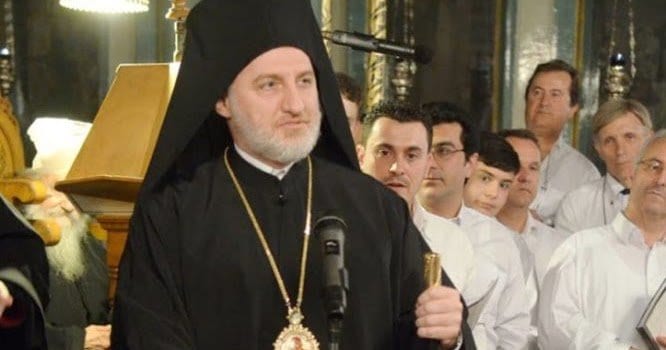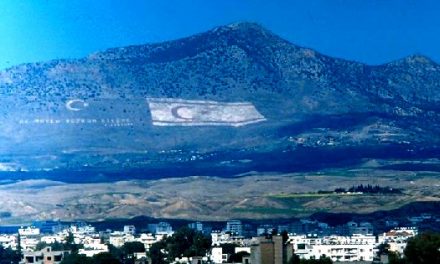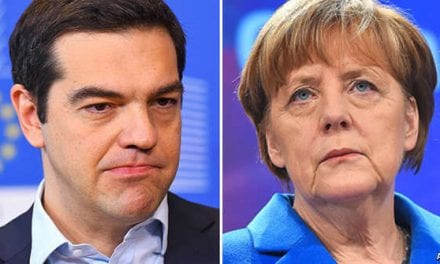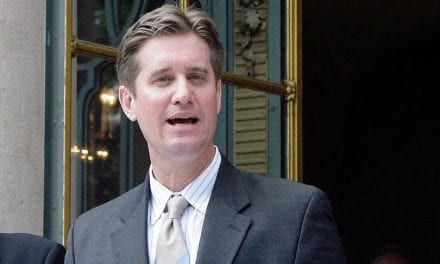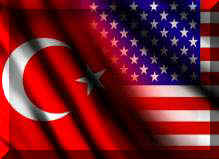In an interview with Kathimerini, Elpidophoros, the new archbishop of America, says he is determined to tidy up the archdiocese’s finances and make sure there is full transparency in the administration of donors’ contributions.
By Alexis Papachelas
A key goal will be to complete construction of St Nicholas Orthodox Church at Ground Zero, a project that has been stalled for months amid allegations over missing donations and cost overruns. Elpidophoros, who was selected earlier this month to replace Archbishop Demetrios of America following the latter’s resignation, stresses that he will defend the rights of Hellenism around the globe, as well as national matters in collaboration with Greek-American and Cypriot advocacy organizations.
How did you feel when you heard you had been elected?
I won’t try to hide that I was glad. I was very glad, in fact, because the United States is a country I love very much – ever since I was a teenager. You see, I belong to one of the last generations to experience the Soviet presence, and for us, the US was always held up as an example, a model and a hope that totalitarian ideas and regimes would not prevail, so it is with such feeling that I have always viewed the United States more generally. When I became an adult and could travel to America, I felt that my feelings for the country had been vindicated. I felt like I was meeting a diaspora, a people that was not familiar to me, and I was impressed by the Greek Orthodox community in the US for its love of the Church, for its patriotism and for its devotion to the Ecumenical Patriarchate. I forged friendships and intellectual bonds, I formed close religious relationships, so it has always been a beloved flock. Being elected brought all of these feelings bubbling in my soul, awakened all these memories and gave me great joy, but I also felt an enormous responsibility knowing the great difficulties the Greek Orthodox Archdiocese of America is experiencing right now.
When he announced the decision, Ecumenical Patriarch Vartholomaios made a reference to the late archbishop Iakovos. Was there some kind of message there? Is Iakovos something of a role model for you in terms of how he ran the American archdiocese?
Several great personalities have passed through the Greek Orthodox Archdiocese of America, yet it is still a commonly held belief that is firmly rooted in the public mind, in the Phanar and in the American diaspora, that Iakovos was the one who really made a difference. Imagine that Patriarch Athenagoras himself was archbishop of America, yet it is Iakovos who is still being talked about. I think that the challenges faced by the Greek Orthodox Archdiocese of America right now are linked to the need for a “Iakovos-style” leadership and administration. His All-Holiness’ reference to Iakovos, who was also a relative of his, as you know, and a compatriot from Imvros, was also, perhaps, a message telling me that I need to prove myself to be a worthy successor to someone of Iakovos’ caliber and to follow in his footsteps.
There are those in the United States who would have preferred an archbishop from among the ranks of those who are already there, who were born in the US. How do you respond to that concern?
I believe that the Greek Orthodox Archdiocese of America has many capable and worthy clerics, officials who are doing excellent work, who are ministering to and serving the archdiocese in a very tangible and effective way, but I do not think that this is the only quality needed. Nativeness has never been a necessary quality for the Church more generally or for the United States alone in the selection of an archbishop. Many of the bishops who serve the American metropolises were not born in the United States. They were born in Greece or elsewhere. Yet no one questions their abilities or their efficiency.
You are going to the US at a time of particular introversion, if not decline, for the diaspora. What are the first things you will do to reverse this climate?
We will have to broaden our horizons beyond the Greek Orthodox community. We need to open ourselves to American society but also to our other Orthodox brothers in America, regardless of their national identity, and this will give us wings. As for the challenges being faced right now, the greatest one is a lack of credibility. Our diaspora basically has to prove that it is once more capable of dealing with major issues effectively and without there being any question of transparency or any other doubts that could arise. The Church of Saint Nicholas is pivotal. It is a matter of national pride and a question of honor for the Greek Orthodox Archdiocese of America. It is an issue that will be solved immediately, right now. Before I even go to America. Before I am even enthroned, this issue needs to be dealt with swiftly, because it reflects on us, it is our image, our face to American society, because it is being built at an extremely significant location for American society, at Ground Zero, where so many people perished, victims of terrorism, and we need our presence there to be a dignified one. I think this will also serve strategically to solve a lot of other issues, because once we start restoring our credibility, we will also be able to deal with the second big issue that is important to our archdiocese. That is the Holy Cross Greek Orthodox School of Theology in Boston, which is our nursery of officials for the archdiocese, the place where we shape and educate our priests before sending them out across America to become leaders, if you will, spiritual leaders, priests who will inspire their flock and bring it back into our churches and our community. The third big challenge is the archdiocese’s overall financial problems.
Some of the people who have been important contributors argue that for them to continue, there needs to be some kind of accountability, some transparency over what happened. How do you intend to respond to their concerns?
I have been taught by the Patriarchate that the money someone gives the Church is sacred. It is sacred because it has been earned the hard way. It comes from the sacrifice of the people offering the money. It is money they are depriving their children, family or business of. Therefore, the Church has a duty to handle this money with the same sanctity and respect it reserves for sacred objects in the Church – that is with the fear of God. And that is something that every benefactor, every person making an offering, every Greek, every Orthodox person should feel. They need to understand that the Church respects the money, and once they do, they will offer even more. This cannot be based only on moral trust generally; there needs to be transparency. As we all know, being moral is not enough; we also need to be seen being moral, we need to be convincing. Therefore, we will follow the same path that every public organization in the United States follows by carrying out an audit so that we know what happened and what we are taking on. I promise that the management will be transparent and everyone will know just how the sacred money they give the Church is being spent and with how much respect we treat it and how we are using it to address real needs.
Do you plan to be the kind of archbishop who has an active involvement in so-called national issues? Is this a custom you plan to continue?
It is widely accepted that the archbishop’s role is linked to national issues but also more generally to the issues of Hellenism globally. That is what people expect of me too. I am prepared to help the Greek-American lobby in its task of promoting Greek interests, of intervening whenever a Greek is being treated unfairly or his freedom and human or religious rights are being violated, to be a defender. I come from a country where this is customary for our patriarch, who taught me to raise my voice whenever I see Orthodoxy being suppressed or a Greek being done an injustice or having his freedoms limited. I will carry on this tradition and I hope to have the cooperation of all the Greek-American and Cypriot organizations. The archbishop is nobody when he’s alone, but he’s almighty when we’re all joined together.
You have good knowledge of Turkey. There is concern that Turkey is drifting away from the West and there is concern about its relationship with Greece. What is your opinion on these issues?
Turkey is a big and strong country. It has a well-organized state and a powerful army. It is a strong neighbor with a large population with whom Greece as well as Cyprus must always maintain good ties. All these countries need to work together, to pursue constructive cooperation. This cannot take place at the expense of justice, nor at the expense of history, nor at the expense of reality. We are condemned, in the good sense of the phrase, to maintain friendly relations, because any tension, any aggressiveness, any intolerance would be destructive for all sides. It would be very easy to safely adopt aggressive, intolerant rhetoric. This is the easy thing to do. The hard thing is to come up with solutions.
First crash test
We are in the midst of a type of cold war between Russia and the United States, the West more generally. Matters of the Church – a sort of cold war between the churches – have also been at the epicenter of this. Did the Ecumenical Patriarchate carefully weigh its options when it did what it did vis-a-vis Ukraine, and is there a danger of Vartholomaios being isolated by the Orthodox community?
Relations with Russia are, unfortunately, a very sensitive chapter. Because for those of us who remember what Soviet times were like, the Soviets were always better at propaganda and at infiltration that anyone else was. This is still the case today. Russian propaganda built the foundations for bridges in Greece and the Balkans which were there for it to use when the need arose. The need arose now and it used them, as we know, very recently, and, indeed, within an ecclesiastical orthodox field to which it had easier access because of the commonality of dogma and of orthodoxy – and the chance arose with the Ukrainian ecclesiastical issue. The Ukrainian question is not just ecclesiastical. It is a very sensitive issue for the Russians, with geostrategic, energy, defense and ecclesiastical dimensions.
Is there a risk of the Patriarchate becoming embroiled in a very tough geopolitical game?
The geopolitical game was already afoot; the Patriarchate didn’t create it. The Patriarchate showed understanding for the situation of the Church of Russia during Soviet times, because we knew that it didn’t have the freedom to take a different stance than that dictated by state policy. That is why the Patriarchate did not put the Russian Church in a difficult position by declaring autocephaly for the Orthodox Church of Ukraine. But there is one rule, which had been noted by Photios I, the theologist and patriarch, and has applied throughout the Church’s history: that the affairs of the Church always follow developments in politics. To put it in present-day terms, geostrategic developments also determine developments in the Church. This is a very wise lesson and it is a good thing that it was applied by our Fathers throughout history, because this has safeguarded the survival of the Orthodox people and churches. Churches cannot operate as if we are still living in Soviet times.
Ecumenical Patriarch Vartholomaios is planning a visit to the United States, where he will possibly also meet with US President Donald Trump. Are you at liberty to say anything more on the subject?
The ecumenical patriarch has visited the United States on multiple occasions and has always been received by the president with all the honors of a head of state, as is the case throughout the world. I think that the United States understands the role, the importance and the value of the Ecumenical Patriarchate over the decades and supports the Patriarchate for abhorring fanaticism and fundamentalism, and for believing in dialogue. Because we are in concert with American ideals on this point, cooperation has always been very good, which is why I believe that on this visit too, the patriarch will be received in the manner which he and the institution of the Ecumenical Patriarchate, of which he is the leader, deserve.
From what I understand, this visit will take place right after your enthronement.
Yes, it will be the first crash test for my administration, but I am lucky to have the officials of the Greek Orthodox Archdiocese of America, who are very capable and experienced, and who have been through similar visits, so I don’t expect there to be any difficulties. I have faith in my associates; I will be met by some very capable people and they will help me. These same people, and indeed the archons who have always stood at the side of the Patriarchate, will, I believe, rise to the occasion once more and welcome the patriarch in the manner he deserves, in the manner we deserve to welcome our spiritual father.
What would you like your legacy to be on this difficult mission that has been assigned to you by the patriarch?
What I would like to leave behind is a deserving successor. A capable person. I do not want to leave chaos in the wake of my passage in this archdiocese. I want to elevate the archdiocese to the eminent position it deserves because – it has been said before but I want to stress this – it is the crown of the Ecumenical Patriarchate’s eparchies among the diaspora, the best that it has to show in terms of its eparchies abroad. Therefore, I do not want to shoot through here like a comet, doing a few things and leaving ashes behind me. I want to train capable officials who are loyal to the Ecumenical Patriarchate, who are actuated by the Orthodox tradition, who will love our history as Greeks but also as Orthodox, and who will continue this legacy for the generations to come. I want the new generation that succeeds me to be much better than me and than all the previous archbishops before me.
Some argue that the Greek-American diaspora is a lost cause. In the sense that we have more deaths than baptisms, this appears to be an institutional problem. And of course history has taught us that Hellenism has never done well without a strong diaspora at its side. Is there a solution to this problem?
You are right, but that is what it looks like from Athens. Things look a little different from New York, because the expectations of someone looking at the Greek community in America from Athens is different to the reality over there. The Greek-American diaspora can help Hellenism – in Greece, in Cyprus, in Istanbul, anywhere it’s needed – but not on the terms and perhaps not to the expectations that we imagine here in Athens, because sometimes, we do not have a true picture. If we sit down with the diaspora in America and listen to them, we will see that some things are different but we will also create new possibilities that we may not have imagined and which they can help us understand. I am optimistic.

